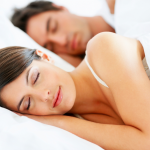Are you getting enough sleep, or are you too tired to tell? "Insomnia is a bona fide health problem," says Dr. Rubin Naiman, PhD, an internationally-recognized leader in integrative sleep and dream medicine. "Skimping on sleep has a price, including weight gain, diminished immune responses, lack of concentration, irritability, and depression.” What’s more, sleep experts agree that sleep is a significant factor in athletic performance. Check out these research-based tips for getting better sleep—Some may look familiar, and some may surprise you:
Block the light: Darkness is essential for a good night’s sleep, and light pollution can hamstring our best efforts to catch some zzz’s. In fact, before Edison invented the lightbulb, people regularly slept 10 hours a night. “We have lights on 24/7, which keeps our brains chronically aroused," Naiman says. The tip? An hour before bed, dim the lights and turn off the TV and computer, then make your bedroom as dark as possible (use blackout shades if needed).
Make tub time: It’s no surprise that anxiety keeps us from dreamland. "Worrying prompts your body to produce the adrenaline-like chemical epinephrine, which keeps you awake," says Joyce Walsleben, associate professor of medicine at the New York University School of Medicine. She suggests a warm bath an hour before you turn in, since the body’s temperature change during bathtime helps promote sleep.
Sleep in on the weekends: A study in the journal Sleep found that adults who were sleep-deprived for five days could increase their baseline brain function and alertness when they slept for 10 hours the next night. But remember: Sleep only an hour or two more than you would normally during the week. If you can’t sleep in the morning, take a 20-minute nap in the late afternoon. It will help you feel more rested, but won’t mess with your internal timetable.
Exercise! As long as you finish your workout two or three hours before going to bed, exercise is actually one of the BEST sleep medicines. A study in the Journal of Sleep Research found adults who rode a stationary bike for about 35 minutes, finishing two hours before bedtime, slept better than when they didn't exercise. At the minimum, get a half-hour of moderate aerobic activity every day, even if it's only brisk walking, says James Maas, a professor of psychology at Cornell University and author of "Power Sleep" (HarperCollins).
Cut the caffeine and cocktails: It's generally a good idea to cut out coffee, soda, and energy drinks seven to eight hours before bedtime. And for alcohol – it may help you doze quicker, but research shows you often wake up during the night. The best rule: Have your last alcoholic drink three hours before bedtime.
Try pet therapy: If you feel lonely, you're likely to wake up more often during the night, a University of Chicago study found. Consider a furry friend. The companionship of a dog or cat may actually help you sleep better.
Get the app: Using mobile apps to track your sleep patterns (like Zeo Sleep Manager, Lark or the Renew SleepClock) can help you make the changes you need for a great night’s rest.

